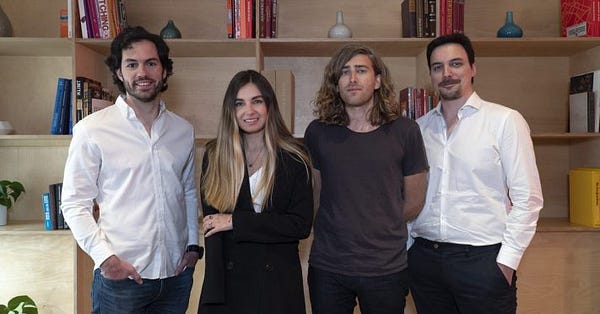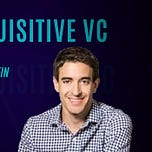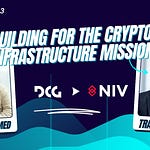Jeff Weinstein is a Partner at FJ Labs, a global marketplace investor also investing in crypto and Web3. Jeff was previously a Senior Associate at Lux Capital.
We talk about his entry into VC, the FJ Labs thesis, why they are investing in crypto, problems marketplaces face and more!
The podcast is also available on your favourite podcast sources like Spotify, Apple and Youtube!
NA: So, I, would love to start with how you got into the world of venture capital personally?
JW: Sure, sure. A little bit about myself. I grew up in New York. I attended university of Pennsylvania where I studied PPE, Politics, Philosophy and Economics. I have always been interested in technology.
I went to computer camp growing up. I used to build computers and I've always been interested in business. My dad worked in finance. I always loved investing. I heroes growing up where instead of the quintessential NBA player or musicians, they were amazing investors. And so, in spite of that, I didn't know what venture capital was until long after I graduated college, actually, I didn't know that there was such a profession.
I think probably because I grew up in New York and back in 2011 venture was still a developing ecosystem in New York City, relatively confined to the Bay Area. So, in 2011, after I graduated school, I joined a small fund of hedge funds where I was working on marketing investor relations. I was there for two years and the fund actually went under. Hedge funds, had a really brutal couple of years from 2011 to 2013 and fund of funds are hedge funds with another layer of fees.
So, it was extremely brutal and. And in the end of 2013, my fund started to go under. And so, I ended up finding an up-and-coming firm in New York called Lux Capital. Lux is a bit more well-known now, but at the time they had just closed on their fund two and they were looking for someone with my skillset of fundraising and investor relations in alternatives.
I joined them in 2013, and I worked there for four years, and I fell in love with the venture industry. I wasn't an investor myself, but I was able to join all of our investment committee meetings. And I was able to see how some of the best investors in the world thought about a company's prospects, what they looked for in founders.
And it was really an incredible chance to learn from some of the best. And so I was at Lux for four years. At that time, I knew I wanted to be an investor and the typical Lux investor had a terminal degree in the hard sciences and were investing in deep tech, that was not my background.
And so I was started thinking about next steps. I got recruited over to FJ Labs, who was looking for someone who had the ability to be a strong investor with a strong financial background, but someone who also could help them raise outside capital. And one thing led to another and I joined in 2017 and it's been a great trip ever since.
NA: Love that. Yeah. I definitely know of Lux, I have a background in biomedical science and I've been really interested in the deep tech side. And, you know, Lux is probably one of those premier funds, like leading it on that cutting edge.
JW: That's right. It was an honor to learn under Josh and Peter and Adam and see some of the most amazing companies in the world.
NA: No doubt. Could you elaborate on FJ Labs? The marketplace thesis of FJ Labs and why that is the current focus?
JW: Sure. So, so quick background then FJ Labs, and that I can talk about why the marketplace business model is so intriguing. We were founded by two serial entrepreneurs, Fabrice Grinda, originally French. He has built and sold three businesses. His first startup was an online auction site for France called Aucland. He raised money from the Bernard Arnault. Who's the founder of LVMH and a bunch of other investors. He sold that. Then he built the world's leading online ringtone and wallpaper business for cell phones.
Sold that, and then last but not least, he built one of the world's leading online classified sites. So in the US we have a business called Craigslist. He built Craigslist for emerging market countries launched in over 40 different markets. Grew it to over 300 million monthly unique users and sold that to Naspers in 2010 and stayed on as CEO until 2013.
Jose built an online auction site for Latin America, which ended up merging with Mercado Libre, which is now far and away the largest tech company in Latin America. So, the two of them have deep expertise in building and scaling online marketplaces. Now online marketplaces are a really interesting business model because although they're very hard to get off the ground, once you can get the business, the flywheel really spinning, the network effects in a marketplace become extremely powerful.
So, you might've heard of the chicken and the egg problem. Essentially, a marketplace is a two-sided marketplace. You have supply and demand. Imagine Uber, you have drivers and you have riders. The Uber app itself, there's not much technical, technological innovation there. What you have is you basically have a marketplace that is facilitating the connection between drivers and riders. So, no one really wants to use the Uber app if there are no drivers or riders. So, it's very difficult to jumpstart a marketplace. You need to get drivers in order to get riders, you have to get riders in order to get drivers.
Now, once you're able to start to build liquidity, which is basically the density of connections on the marketplace it really kicks off because the more drivers on the platform, the better experience it is for riders. Which then in turn attracts more riders, the more riders in the platform, the more business you're driving to drivers.
And so, this kicks off this feedback loop and you can create some of the most scalable business models in the world. And if you look at US IPOs recently four of the five largest IPO's in the US, tech IPOs were marketplaces. So, Door Dash, Airbnb, Uber, Lyft all have in common that they're marketplaces. And so, it's a beautiful business model when done right. And there's no tech risk and there's purely execution risks.
NA: Yeah, that's definitely a really interesting, cause it seems like a hard business model to get going. What have you seen, are the biggest pitfalls a few of the businesses you've invested in encounter when they're bootstrapping that liquidity onto the platform?
JW: Frankly, bootstrapping liquidity is the key challenge for a marketplace and making sure that the supply and the demand are overlapping because depending on the marketplace, you might have to build liquidity on a hyper-local basis.
So with Uber, you actually have to build liquidity market by market. If you have drivers in New York and you have riders in San Francisco, you don't have a market. So, Uber is an example where you have to go scale city by city. On the other hand, sometimes you have international marketplaces where you might have something like Upwork, where you need someone to help you with your website they could be anywhere in the world. They could be in Romania, they could be working on your website while you're in New York. So the supply and the demand don't have to overlap in the same city.
So, marketplace design is very important to think about when you're scaling a marketplace. What are the unique traits for your marketplace and what do you have to do to facilitate the flywheel spinning?
Are you building liquidity on a hyper-local basis? on a local basis? potentially on an international basis? What are your acquisition channels? Is your marketplace supply constraied or demand constrained. Most marketplaces it's usually harder to recruit one side of the marketplace, and so that should be your focus and how are you recruiting that? And then not only that, how are you retaining that? What are your key metrics? Every marketplace has different metrics that matter. You have to distil which ones matter and think about how you, how you can optimize them
NA: For sure. I think that's super helpful. I'd love to hear, what strategy and thinking around investing in the crypto market is for you and FJ Labs?
JW: Crypto is interesting because a lot of the marketplace dynamics that you see with traditional internet marketplaces are amplified in crypto because now you have the ability to incentivize people using tokens.
The network effects work to the extreme in crypto. And that's why you're seeing almost every crypto project has some form of network effects, but it's not necessarily the traditional network effects that you see. Because the tokenization, the element of having a token to coordinate incentives really changes the game.
And there are all sorts of interesting things you can do with token economics to coordinate human behaviour. And so, we think that crypto is extremely interesting. I mean, we've invested in 30+ different crypto projects already. And the different themes that interest me at the moment, we're very interested in infrastructure, we think that laying the quote-unquote pipes of crypto, it's still very early days and it's still extremely cumbersome for normal users.
It's a kin to using the internet in the early days, or even pre the web browser, you can see, I mean, if you just look at Metamask, Metamask has kind of become the gateway to blockchain apps, even Metamask it's still extremely cumbersome to use.
We are investing in different crypto infrastructure plays. We invest in on-ramps and off-ramps. So, we're investors in Moonpay, we're investors in Wyre. We're looking at a number of other companies in this space. Then we're investing in staking companies. We were seed investors in Figment, which helps investors who have Proof of Stake coins, like Ethereum now, stake, their Ethereum for rewards. And so we're very interested in, other forms of crypto infrastructure.
Then we're also interested in exchanges, exchanges, are marketplaces. So, we're investing in centralized and decentralized exchanges all around the world. One of our entrepreneurs-in-residents built a decentralized exchange called Clipper, which is actually a decentralized exchange intended for small trades because often if you use a Uniswap or a Sushiswap, you're not getting the optimal price, if you're making a trade of $10,000 or less. So Clipper has intentionally constrained the size of their liquidity pool so that if you're making small trades, you're still getting the best prices.
And so, we're also interested in the consumerization of DeFi, as complicated as crypto is for normal people, DeFi or decentralized finance is a whole another level. It's like a foreign language to people, but there are a lot of really interesting use cases for people and some of the yields that you can earn in DeFi are staggering, especially compared to the near zero interest rates that you're seeing in traditional finance.
So, we're looking at a lot of different ways to put a beautiful user interface on top of a DeFi project and make it really easy for normal people to use. So, I call that consumerization of DeFi, consumerization of crypto. And then we're really interested in NFTs and not only just the art of NFTs, but also potentially utility NFTs, the concept of having a non-fungible token that you could use for identity, you could be using it for advertising.
I think we don't really know yet what a lot of the killer use cases are going to be. So, we're interested in doing a bunch of experiments to make sure we're investing all over.
NA: Yeah, I love that. So, you'll be essentially investing across the entire crypto sector. How was the conversation you had with LPs when talking to them about entering the crypto market?
JW: It's actually worth noting one thing. We are angel investors, we don't lead, we don't take board seats. We have a very diversified portfolio, much more so than the typical venture fund. We have hundreds of investments that we make a year, our first institutional fund head up at 112 investments. Our second had 500 investments. Our third will probably have around 500 investments as well. That's very unusual for venture capital. We think it's mathematically optimal.
Our LPs are interested in backing Fabrice, Jose and the institution that we've built at FJ Labs. They’ve proven to be some of the most successful angel investors in the world. And a bet on FJ Labs is it is a bet on us, a bet on our heuristics, a bet on our ability to work with some of the most interesting up and coming tech talent all around the world. Crypto was a natural next place for us to invest. So it was never was really a question from our LPs about investing in crypto.
NA: Okay. No, that's great to hear. And that's given me like to two areas I want to pick on. Firstly, with crypto venture capital becoming, very competitive to get into these rounds, they're moving incredibly quick. Why do crypto founders choose to go with FJ Labs as an investor?
JW: The great question. What we have found is that a lot of the network effects expertise and the marketplace expertise that we have from building and investing in start-ups is directly applicable to crypto. And when you're thinking through network effects, token economics, these are all network effects.
Rather these are all these are all highly applicable in terms of how we invest. We're able to make decisions in one to two phone calls. We're easy to work with. We write small tickets, but for that small ticket, you unlock the entire FJ Labs network. And we have relationships with almost every fund in the world.
It sounds like an exaggeration, but it's true. Every fund, I should say every institutional fund, there are plenty of small funds out there that we may not know. But if you're doing well and you're raising your next round, we will roll out the red carpet to introduce you as a founder, to the best of the best funds.
And so we only do this for companies that are doing well. So, it's a warm intro and that warm intro has a very, very high conversion rate. And so, in some we have deep marketplace and network effects expertise. We have the world's largest portfolio of online marketplaces. We are easy to work with. We write small tickets; we decide quickly and we can help you get funded.
NA: Perfect. Okay. Yeah, that definitely makes a lot of sense. And I guess the other part of that was, as you said, doing over a hundred deals a year, what's the process that you employ in order to achieve that kind of fast paced deal-making strategy that you employ?
JW: The pattern matching recognition that we've developed from investing in 700 start-ups, the majority of which are marketplaces, we're able to suss out in two forty-five minute phone calls. I'm not sure if you've ever heard of the Pareto Principle, you can basically glean 80% of the information that you need from the 20% that matters.
And this applies across all sorts of different fields. The key here is that we don't lead, we don't lead. We rely on an institutional VC fund to take the lead position, usually to take a board seat, to set the terms, to do proper diligence. So, if we know that a fund that we like, we respect and we trust is leading, they're doing the diligence, they're taking a board seat, they're setting the price. From there, we can quickly evaluate if we like the founder, if we like the business model, if we like the metrics of capital efficiency and we can make a quick decision.
And so, we can pattern match based on all of the marketplace heuristics that we have seen. And so. It makes it easy for us to very quickly make decisions.
NA: Got it. What would be your advice to someone who's looking to get into the world of venture capital?
JW: There's no one answer. There are a bunch of different ways you can get in. You'll see, journalists, frankly, venture capital is often a relationship driven business. That's why you see a lot of journalists who have incredible founder relationships, you can see them break in. You can also see people who are just extremely analytical and build a personal brand for themselves.
I mean, there's a guy on Twitter, Turner Novak. He just basically memed himself into being a GP and raising money for a fund. It's funny, but frankly, it's an edge, being a meme king on Twitter is an edge. I think the best way is to be a founder, is to be a successful founder, is to build deep, deep operating expertise and just try your hand at angel investing.
You don't have to have money to angel invest. It sounds crazy. But now with platforms like AngelList, if you have access to deal flow, you can help syndicate it. And it might take a little while, but with practice and with the right relationships, you can build up a track record through syndicating angel deals prove that you can get differentiated deal flow and take it from there.
I think that this is an interesting trend that we're seeing is the democratization of venture capital. It used to very much be the quintessential old boys club on Sandhill Road. I like to call it like an entrepreneur's retirement home where you'd have a lot of entrepreneurs who are investors who had nice cushy lives hanging out in Palo Alto, and just kind of investing in their friends and not investing... It used to be until pre COVID, the vast majority of Bay Area VCs would not invest outside the Bay Area because they wanted to be within driving range of the founder. That's completely changed and venture is completely globalized.
And so now you can have venture investors anywhere in the world, and you're seeing that traditional venture funds are investing anywhere in the world, which is amazing. I think Turner Novak shouting out at him again. I think he built a fantasy venture portfolio online as part of his tweeting.
He, basically built a fantasy portfolio. He attracted the attention of an open-minded high net worth individual. He ran a fund for him, did very well, continued to build this audience and now he has a fund. It's hustle. It's grit, tenacity and it's making a name for you. And so, you can always do it the traditional way, which is apprenticing at the storied funds.
And you'll see a lot of people do that. Insight is a really famous fund that develops talent. They, attract from the top Ivy league schools and that's usually it. And then you can also, you know, do the traditional investment banking business school route. For sure. That's probably the best way to get in is to get into one of those, hallowed institutions and to compete in these very selective recruiting processes. That's still the norm, but that's certainly not the only way. And I see entrepreneurial driven people breaking into the industry.
NA: Yeah, no, I think that was really helpful. There's definitely so many ways like Turner is definitely a great example of like a new and interesting way to get into that world. And heading into like our final questions. What's a secret obsession of yours that not many people know about?
JW: Distance Running. I mean, it’s a big part of my identity. So if people know me, they probably know this, but I ran track and field in college. I still run track and field. It's been a dream of mine to break four minutes in the mile. I have a baby now, so it's looking a little bit less likely, but I'm still at running 60 to 80 miles a week. Training very hard.
I admire, I don't know if you know of Nick Willis, but New Zealand has a storied running tradition and Nick Willis is a hero of mine. He's still running sub four-minute miles late into his thirties. And so, I am obsessed with distance running.
NA: Super cool. And finally, what's the latest, publicly announced investment you've made and why did you make it?
JW: Well, we have a very high cadence, so I can't tell you what the latest announcement is, but I can tell you one of the latest big investments we made is a business called Mundi, which I'm on the board of. Mundi is a business that we incubate. We haven't touched on this, but once or twice a year, we will actually be very hands-on and help form a business.


And we work with very entrepreneurial MBAs and we will pre-seed them and we will help them assemble their founding team. Mundi is trade factoring for exporters, and the core business is lending to Mexican exporters who trade into the US. They found an amazing pain point. The business is only a year and a half old, and they've grown like 50 or a 100X.
They just raised a $16 million Series A led by Union Square Ventures. And we were able to invest more in this round. And this is a business where we have healthy ownership. Martin is a fantastic operator. He actually used to work at OLX, which is Fabrice’s startup, and he worked at BCG and he is a really just excellent, excellent operator.
And it's been an honour to see him go from the ideation stage when we were just brainstorming ideas in our conference room to now having raised over 20 million of venture capital and growing like a weed.
NA: Very interesting. Yeah. It's cool to know that you are looking into like the incubation model as well, and it's working out.
JW: Yes. Yes. It's very interesting.
NA: Cool. That's all the questions that we have for today Jeff. Thanks so much for joining me. I really appreciate your time. And I think it was really insightful.
JW: Thank you for the kind words. And I hope people found that interesting.
Follow me and Jeff on Twitter here!
Disclaimer: The Inquisitive VC is provided for informational and educational purposes only and is not intended to provide commercial, financial or legal advice. Nothing in this article constitutes an offer of securities or regulated financial products or financial services to any persons or a solicitation to buy or sell any tokens or securities or to make any financial decisions. Do not trade or invest in any project, tokens, or securities based upon this podcast episode. The host and guests may personally own tokens or be an investor in projects that are mentioned on the podcast.












